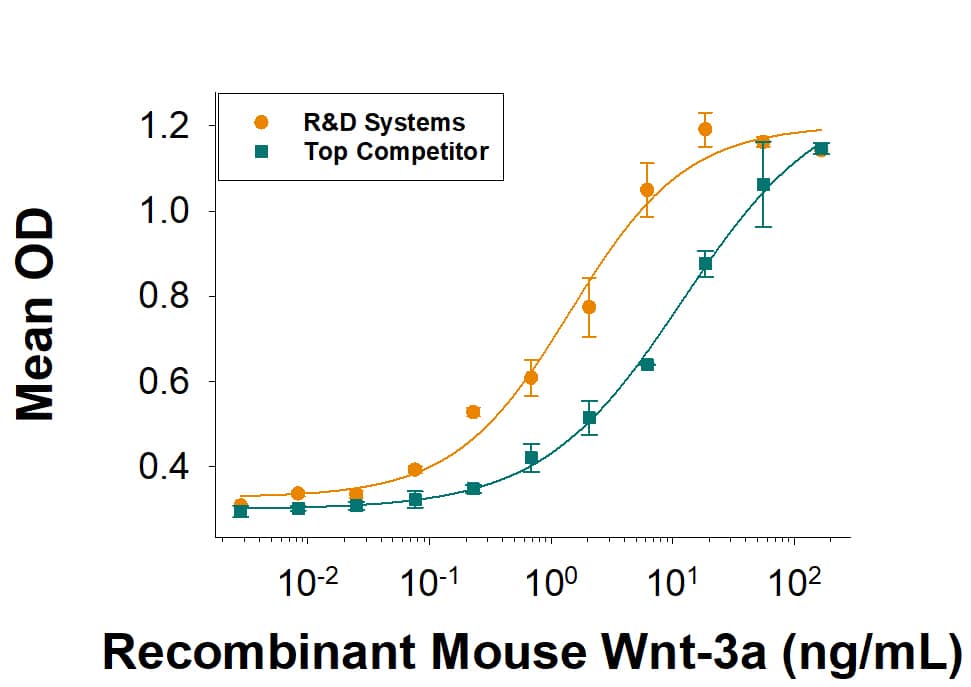Recombinant Rat FGF-10 Protein Summary
Product Specifications
Gln37-Ser215, with an N-terminal Met
Analysis
Customers also Viewed
Product Datasheets
Carrier Free
CF stands for Carrier Free (CF). We typically add Bovine Serum Albumin (BSA) as a carrier protein to our recombinant proteins. Adding a carrier protein enhances protein stability, increases shelf-life, and allows the recombinant protein to be stored at a more dilute concentration. The carrier free version does not contain BSA.
In general, we advise purchasing the recombinant protein with BSA for use in cell or tissue culture, or as an ELISA standard. In contrast, the carrier free protein is recommended for applications, in which the presence of BSA could interfere.
7804-FG
| Formulation | Lyophilized from a 0.2 μm filtered solution in MOPS, Na2SO4, EDTA and DTT with BSA as a carrier protein. |
| Reconstitution | Reconstitute at 100 μg/mL in PBS containing at least 0.1% human or bovine serum albumin. |
| Shipping | The product is shipped at ambient temperature. Upon receipt, store it immediately at the temperature recommended below. |
| Stability & Storage: | Use a manual defrost freezer and avoid repeated freeze-thaw cycles.
|
7804-FG/CF
| Formulation | Lyophilized from a 0.2 μm filtered solution in MOPS, Na2SO4, EDTA and DTT. |
| Reconstitution | Reconstitute at 100 μg/mL in PBS. |
| Shipping | The product is shipped with polar packs. Upon receipt, store it immediately at the temperature recommended below. |
| Stability & Storage: | Use a manual defrost freezer and avoid repeated freeze-thaw cycles.
|
Background: FGF-10
The Fibroblast Growth Factors (FGFs) are heparin binding glycoproteins that exert a variety of biological activities toward cells of mesenchymal, neuronal, and epithelial origin. FGF-10 belongs to the subgroup of FGFs that also includes FGF-3, -7, and -22 (1). Mature rat FGF-10 is an approximately 20 kDa protein that contains a serine-rich region near its N-terminus (2). It shares 96% and 91% amino acid sequence identity with human and mouse FGF-10, respectively. FGF-10 is secreted by mesenchymal cells and associates with extracellular FGF-BP (1, 3). It preferentially binds and activates epithelial cell FGF R2 (IIIb) and interacts more weakly with FGF R1 (IIIb) (4). FGF-10 plays an important role in many tissues during embryogenesis. This includes limb bud initiation (5), palate development (6), branching morphogenesis and directional outgrowth of lung buds (7, 8), formation of the otic vesicle and chochlea (9), adipogenesis (10), folliculogenesis (11), cardiomyocyte differentiation (12), and the development of prostate, mammary, lacrimal, and submandibular salivary glands (13‑16). FGF R2 (IIIb) signaling in these responsive tissues is similarly important during embryogenesis (6, 9, 14‑16). The expression and function of FGF-10 are negatively regulated by Shh and BMP-4 in the developing lung (7, 8). Overlapping expression patterns and activities with FGF-3, -7, and -8 suggest at least a partial redundancy in FGF-10 biology (6, 8, 15, 16). FGF-10 signaling through FGF RIIIb also contributes to the progression of pancreatic cancer (17).
- Beenken, A. and M. Mohammadi (2009) Nat. Rev. Drug Discov. 8:235.
- Yamasaki, M. et al. (1996) J. Biol. Chem. 271:15918.
- Beer, H.-D. et al. (2005) Oncogene 24:5269.
- Zhang, X. et al. (2006) J. Biol. Chem. 281:15694.
- Min, H. et al. (1998) Genes Dev. 12:3156.
- Rice, R. et al. (2004) J. Clin. Invest. 113:1692.
- Bellusci, S. et al. (1997) Development 124:4867.
- Weaver, M. et al. (2000) Development 127:2695.
- Pirvola, U. et al. (2000) J. Neurosci. 20:6125.
- Sakaue, H. et al. (2002) Genes Dev. 16:908.
- Zhang, K. et al. (2010) Reproduction 140:815.
- Chan, S.S.-K. et al. (2010) PLoS ONE 5:e14414.
- Donjacour, A.A. et al. (2003) Dev. Biol. 261:39.
- Mailleux, A.A. et al. (2002) Development 129:53.
- Makarenkova, H.P. et al. (2000) Development 127:2563.
- Jaskoll, T. et al. (2005) BMC Dev. Biol. 5:11.
- Nomura, S. et al. (2008) Br. J. Cancer 99:305.
FAQs
No product specific FAQs exist for this product, however you may
View all Proteins and Enzyme FAQsReviews for Recombinant Rat FGF-10 Protein
There are currently no reviews for this product. Be the first to review Recombinant Rat FGF-10 Protein and earn rewards!
Have you used Recombinant Rat FGF-10 Protein?
Submit a review and receive an Amazon gift card.
$25/€18/£15/$25CAN/¥75 Yuan/¥2500 Yen for a review with an image
$10/€7/£6/$10 CAD/¥70 Yuan/¥1110 Yen for a review without an image













